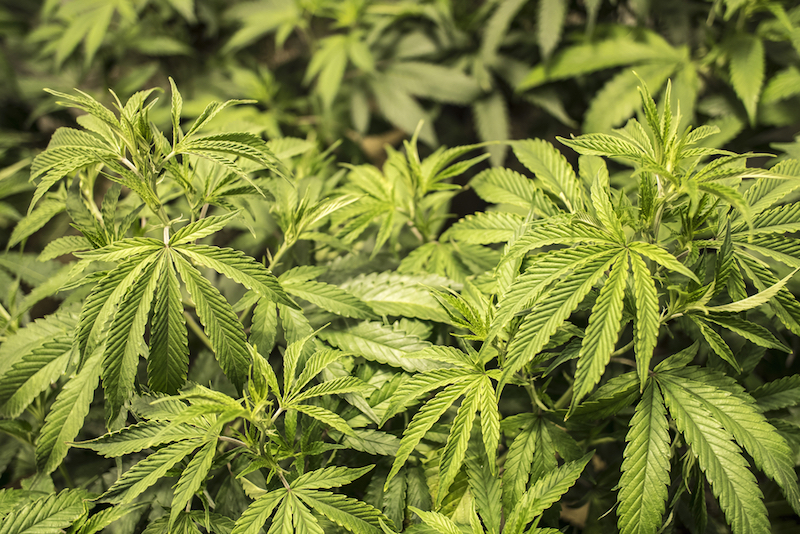Medical Marijuana Programs May Help Cut Opioid Use

Making medical marijuana legal may lead to a reduction of opioid use in adults under the age of 40, a new study suggests.
The researchers found that the rates of opioid use decreased in adults ages 21 to 40 in states that had legalized medical marijuana and where residents with prescriptions could obtain cannabis from dispensaries or grow their own, compared to states that had legalized medical marijuana but did not yet have an operational program for people to obtain it.
However, the finding didn't apply to adults over 40. For this group, opioid use did not decrease in those states with operational medical marijuana programs, according to the findings, which were published online today (Sept. 15) in the American Journal of Public Health. [Healing Herb? Marijuana Could Treat These 5 Conditions]
These findings seem to support the idea that marijuana may offer a substitute for opioids in people ages 21 to 40 who have severe or chronic pain, said lead author June H. Kim, a doctoral candidate in epidemiology at the Columbia University Mailman School of Public Health in New York City.
There is other evidence that medical marijuana may act as a substitute for opioids in states that have passed this legislation: A study published in JAMA Internal Medicine in 2014 suggested that the legalization of medical marijuana in U.S. states appears to be linked with lower death rates from opioid overdoses within that state.
Medical marijuana and opioid use
Opioid use can be difficult to measure in general, but a positive test for opioids in the blood or urine provides a clear indication of prior use, the researchers wrote. However, in the new study, the researchers did not have data that was drawn from the general population showing people who tested positive for opioid use while they were alive, so instead, they used toxicological data from deceased individuals.
In the study, the researchers looked at data from toxicological tests for alcohol and other drugs that were found in the systems of drivers killed in car crashes. Some states collect this information on a yearly basis for the majority of drivers who die in crashes on public roads, according to the study.
Sign up for the Live Science daily newsletter now
Get the world’s most fascinating discoveries delivered straight to your inbox.
Toxicological testing from deceased drivers who crashed in states that did or did not have medical marijuana laws seemed like an interesting data source, and it is an objective way to evaluate prior opioid use, for both medical or recreational purposes, Kim said.
In the study, the researchers analyzed information from the Fatality Analysis Reporting System database. They included data collected between 1999 and 2013 from 18 states that ran tests for alcohol and other drugs in about 69,000 drivers who died within 1 hour of crashing.
The study found that drivers ages 21 to 40 who died in car crashes after a medical marijuana law was implemented had half the odds of testing positive for opioids, compared to similarly aged drivers who crashed in states before such a law was implemented, Kim said. [7 Ways Marijuana May Affect the Brain]
"That's a pretty moderate-to-large reduction," Kim told Live Science.
Younger adults, older adults
The practical implication of these results is that fewer individuals may be using opioids in states with operational medical marijuana laws, Kim said.
This study's findings are consistent with what is currently known about medical marijuana and how patients have used it, Kim said. Most prior surveys of medical marijuana patients show that they tend to be younger than 45, and most laws set patient age restrictions at 21 and older, he said.
Some states that have legalized medical marijuana are starting to see increases in use by adults over the age of 45, who are seeking out marijuana as a treatment alternative to opioids. It's possible that future studies may find reductions in the prevalence of opioid use in older age groups, Kim suggested.
One limitation of the study is that the findings may not be generalizable to all U.S. states, the researchers said.
In addition, the results establish an association, rather than a cause-and-effect relationship, between the implementation of medical marijuana laws in states and prior opioid use by individuals, the researchers said.
Originally published on Live Science.
Cari Nierenberg has been writing about health and wellness topics for online news outlets and print publications for more than two decades. Her work has been published by Live Science, The Washington Post, WebMD, Scientific American, among others. She has a Bachelor of Science degree in nutrition from Cornell University and a Master of Science degree in Nutrition and Communication from Boston University.











